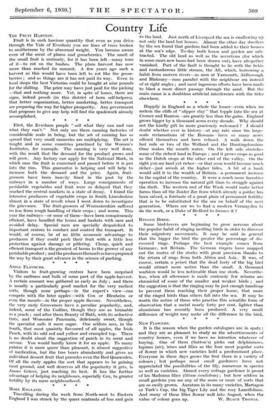Happily in England as a whole the losses—even when we
reckon the cliffs of "slipper clay" that topple into the sea at Cromer and Runton—are greatly less than the gains. England grows bigger by a thousand acres every decade. Why should not the kindly gift be more graciously welcomed ? I should doubt whether ever in history—at any rate since the large- scale reclamations of the Romans—have so many acres offered themselves and been refused. A walk down the last mile or two of the Welland and the Huntingdonshire Ouse makes the mouth water. On the left side stretches some of the richest land in Europe ; and it grows crops as good as the Dutch crops at the other end of the valley. On the right you see land yet richer—or that soon would become much richer—just awash at the higher tides. A bit of a bank would add it to the wealth of Britain—a permanent increase to the capital of the country. It were a much more lucrative operation to increase the natural gift than to struggle against the theft. The western end of the Wash would make better farms than all the Zuider Zee from which already a polder has been salved, a foretaste of a great plain of permanent fertility that is to be substituted for the sea on behalf of the next generation. Where are we to find a modern Vermuyden to do the work, or a Duke of Bedford to finance it ?






























 Previous page
Previous page